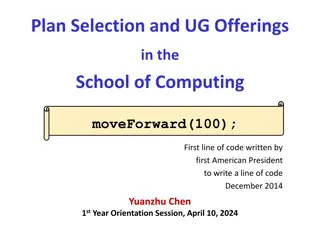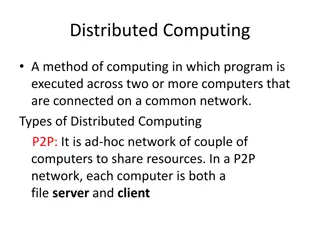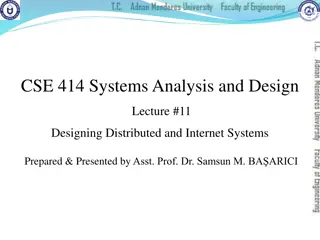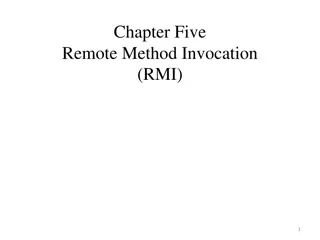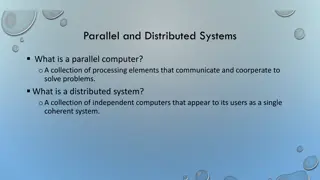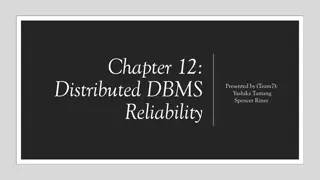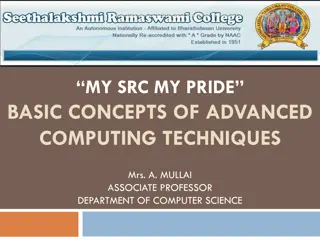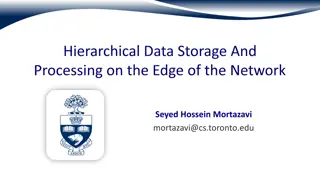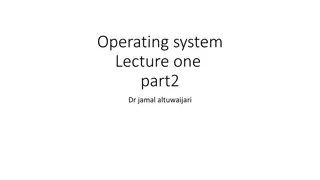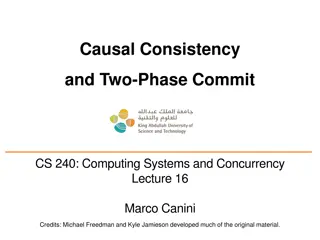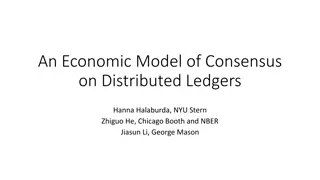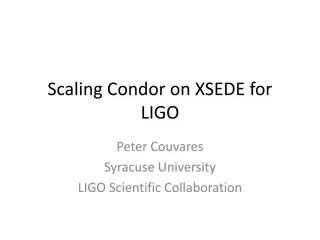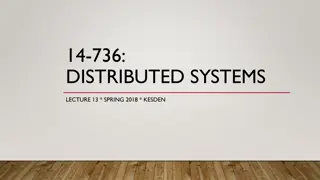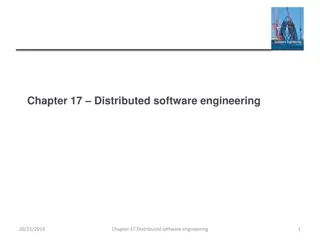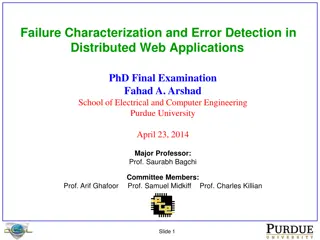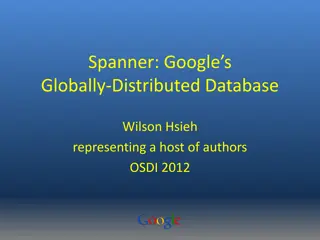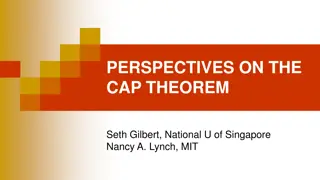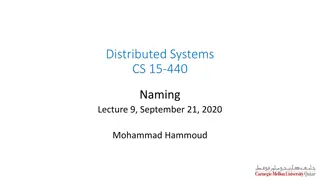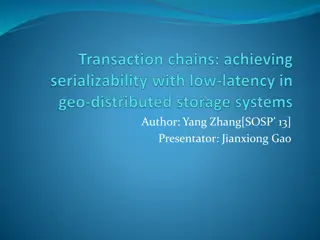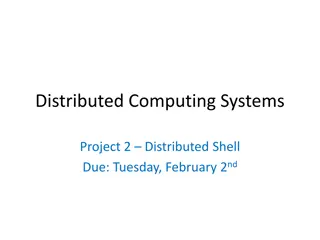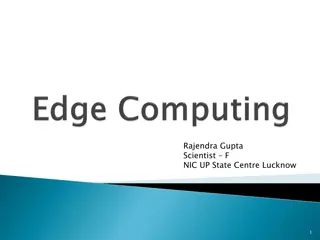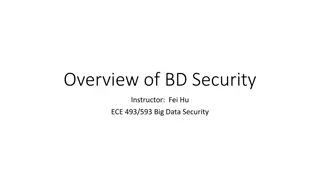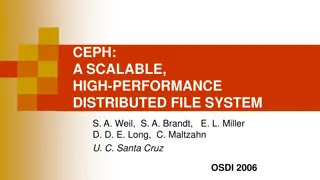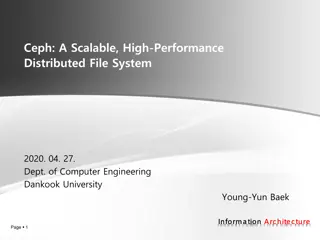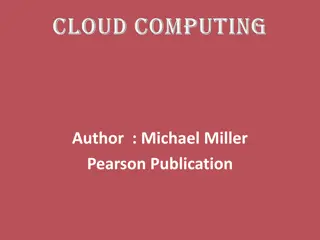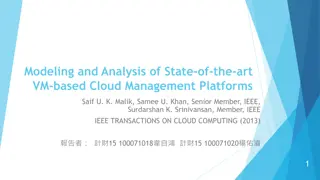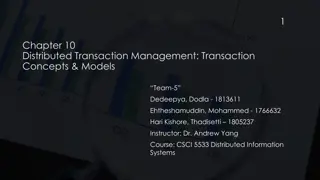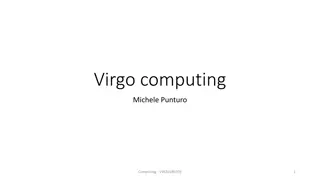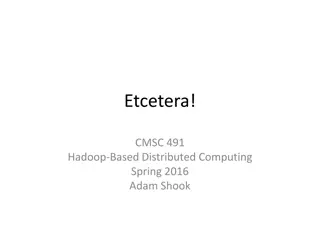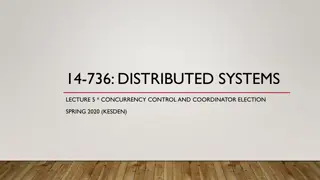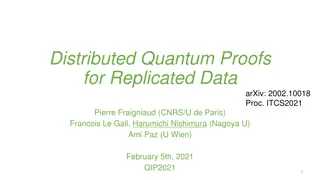Overview of Distributed Systems: Characteristics, Classification, Computation, Communication, and Fault Models
Characterizing Distributed Systems: Multiple autonomous computers with CPUs, memory, storage, and I/O paths, interconnected geographically, shared state, global invariants. Classifying Distributed Systems: Based on synchrony, communication medium, fault models like crash and Byzantine failures. Comp
9 views • 126 slides
Computing Degree Plans and Offerings at School of Computing
Explore the diverse degree plans and offerings at the School of Computing, including Honours and General degrees, minors, and certificates in Data Analytics. Plan selection is crucial for advancing to second-year courses, with automatic acceptance and pending list options available. Discover the var
0 views • 20 slides
Distributed and Cluster Computing Overview
Distributed computing involves executing programs across multiple connected computers, like in peer-to-peer (P2P) networks. Each computer acts as both a client and server. This method offers advantages such as easy setup and cost-effectiveness, but faces challenges like network security risks. On th
1 views • 38 slides
Understanding Parallel and Distributed Computing Systems
In parallel computing, processing elements collaborate to solve problems, while distributed systems appear as a single coherent system to users, made up of independent computers. Contemporary computing systems like mobile devices, IoT devices, and high-end gaming computers incorporate parallel and d
1 views • 11 slides
Designing Distributed and Internet Systems
Learn about the design considerations for distributed and internet systems, including file server versus client/server environments, cloud computing trends, internet standards, and system development life cycle. Explore designing systems for local area networks (LANs) and the process of creating dis
2 views • 51 slides
Understanding Remote Method Invocation (RMI) in Distributed Systems
A distributed system involves software components on different computers communicating through message passing to achieve common goals. Organized with middleware like RMI, it allows for interactions across heterogeneous networks. RMI facilitates building distributed Java systems by enabling method i
1 views • 47 slides
Understanding Parallel and Distributed Systems in Computing
A parallel computer is a collection of processing elements that collaborate to solve problems, while a distributed system comprises independent computers appearing as a single system. Contemporary computing systems, like mobile devices and cloud platforms, utilize parallel and distributed architectu
0 views • 11 slides
Distributed DBMS Reliability Concepts and Measures
Distributed DBMS reliability is crucial for ensuring continuous user request processing despite system failures. This chapter delves into fundamental definitions, fault classifications, and types of faults like hard and soft failures in distributed systems. Understanding reliability concepts helps i
0 views • 58 slides
Exploring Basic Concepts of Advanced Computing Techniques
Delve into the world of advanced computing techniques with Mrs. A. Mullai as she discusses networks, computing, and pervasive (ubiquitous) computing. Discover how networks facilitate data exchange, the role of computing in designing hardware and software systems, and the trend of embedding computati
2 views • 40 slides
Exploring Emerging Technologies in Cloud Computing
Cloud computing revolutionizes accessibility to computing resources through shared pools. Next-generation applications, edge computing, and web applications on the cloud are shaping the future. CloudPath offers a platform for executing third-party applications across distributed data centers. Real-w
0 views • 16 slides
Understanding Cloud Computing, Edge Computing, and Their Applications
Cloud computing entails centralized processing of data on powerful servers, offering scalable resources over the internet. Edge computing brings processing closer to data generation points, reducing latency and enhancing security. Both paradigms cater to different needs such as IoT, autonomous vehic
0 views • 18 slides
Evolution of Operating Systems over the Decades
Operating systems have evolved over the past 50 years through distinct phases, from the early history of primitive machines in the 1940s and 1950s to the development of batch processing systems in the 1960s and multimode time-sharing systems in the 1970s. The 1980s marked the era of personal computi
0 views • 24 slides
Understanding Causal Consistency in Distributed Systems
This content covers the concept of causal consistency in computing systems, exploring consistency models such as Causal Linearizability and Eventual Sequential. It explains the importance of logical clocks like Lamport and vector clocks, and how they ensure order in distributed systems. The concept
0 views • 35 slides
Economic Models of Consensus on Distributed Ledgers in Blockchain Technology
This study delves into Byzantine Fault Tolerance (BFT) protocols in the realm of distributed ledgers, exploring the complexities of achieving consensus in trusted adversarial environments. The research examines the classic problem in computer science where distributed nodes communicate to reach agre
0 views • 34 slides
Distributed Algorithms for Leader Election in Anonymous Systems
Distributed algorithms play a crucial role in leader election within anonymous systems where nodes lack unique identifiers. The content discusses the challenges and impossibility results of deterministic leader election in such systems. It explains synchronous and asynchronous distributed algorithms
2 views • 11 slides
Exploring Orto-Computing: Bridging the Gap Between Formal and Phenomenological Computing
Meaningful experiments suggest a transition from the formal, Turing-based approach to a structural-phenomenological one called Orto-Computing. This innovative concept integrates mind-matter interaction and non-formal functions within computational systems, offering potential solutions to complexity
0 views • 18 slides
Scaling Condor on XSEDE for LIGO - Collaborative Computing Project
The project aims to evaluate the utilization of XSEDE resources by LIGO for large-scale computing tasks, with a focus on distributed computing challenges and fostering a research computing community. Various aspects such as political, cultural, and technical narratives surrounding the collaboration
0 views • 28 slides
Overview of Distributed Systems, RAID, Lustre, MogileFS, and HDFS
Distributed systems encompass a range of technologies aimed at improving storage efficiency and reliability. This includes RAID (Redundant Array of Inexpensive Disks) strategies such as RAID levels, Lustre Linux Cluster for high-performance clusters, MogileFS for fast content delivery, and HDFS (Had
0 views • 23 slides
Distributed Software Engineering Overview
Distributed software engineering plays a crucial role in modern enterprise computing systems where large computer-based systems are distributed over multiple computers for improved performance, fault tolerance, and scalability. This involves resource sharing, openness, concurrency, and fault toleran
0 views • 66 slides
Overview of the Computing Community Consortium
The Computing Community Consortium (CCC) was established in 2006 under the Computing Research Association (CRA) to develop a vision for computing research and communicate it to stakeholders. It aims to align computing research with national priorities, encourage high-impact research, and groom new l
0 views • 48 slides
Challenges in Detecting and Characterizing Failures in Distributed Web Applications
The final examination presented by Fahad A. Arshad at Purdue University in 2014 delves into the complexities of failure characterization and error detection in distributed web applications. The presentation highlights the reasons behind failures, such as limited testing and high developer turnover r
0 views • 53 slides
Google Spanner: A Distributed Multiversion Database Overview
Represented at OSDI 2012 by Wilson Hsieh, Google Spanner is a globally distributed database system that offers general-purpose transactions and SQL query support. It features lock-free distributed read transactions, ensuring external consistency of distributed transactions. Spanner enables property
0 views • 27 slides
Introduction to Mobile Computing Principles and Designing Mobile Applications
Mobile computing systems involve computing capabilities that can be utilized while on the move, leveraging wireless connectivity, small size, and mobile-specific functionalities. The history of mobile computing traces back to military origins and has evolved with technologies like GPS and wireless t
0 views • 98 slides
Introduction to Boston University's Shared Computing Cluster
Boston University's Shared Computing Cluster (SCC) provides researchers with access to a high-performance computing environment for running code, collaborating on shared data, and utilizing specialized software packages. With over 800 nodes, 20,000 processors, and hundreds of GPUs, the SCC offers re
0 views • 63 slides
Understanding the CAP Theorem in Distributed Systems
The CAP Theorem, as discussed by Seth Gilbert and Nancy A. Lynch, highlights the tradeoffs between Consistency, Availability, and Partition Tolerance in distributed systems. It explains how a distributed service cannot provide all three aspects simultaneously, leading to practical compromises and re
0 views • 28 slides
Understanding Distributed Hash Table (DHT) in Distributed Systems
In this lecture, Mohammad Hammoud discusses the concept of Distributed Hash Tables (DHT) in distributed systems, focusing on key aspects such as classes of naming, Chord DHT, node entities, key resolution algorithms, and the key resolution process in Chord. The session covers various components of D
0 views • 35 slides
Distributed Database Management and Transactions Overview
Explore the world of distributed database management and transactions with a focus on topics such as geo-distributed nature, replication, isolation among transactions, transaction recovery, and low-latency maintenance. Understand concepts like serializability, hops, and sequence number vectors in ma
0 views • 17 slides
Overview of Task Computing in Parallel and Distributed Systems
Task computing in parallel and distributed systems involves organizing applications into a collection of tasks that can be executed in a remote environment. Tasks are individual units of code that produce output files and may require input files for execution. Middleware operations coordinate task e
0 views • 17 slides
Distributed Computing Systems Project: Distributed Shell Implementation
Explore the concept of a Distributed Shell in the realm of distributed computing systems, where commands can be executed on remote machines with results returned to users. The project involves building a client-server setup for a Distributed Shell, incorporating functionalities like authentication,
0 views • 14 slides
Understanding Edge Computing for Optimizing Internet Devices
Edge computing brings computing closer to the data source, minimizing communication distances between client and server for reduced latency and bandwidth usage. Distributed in device nodes, edge computing optimizes processing in smart devices instead of centralized cloud environments, enhancing data
0 views • 32 slides
Overview of Big Data Security in Modern Computing Environments
Big data security is a crucial aspect in today's computing landscape, especially with the increasing reliance on cloud computing and distributed frameworks like Hadoop. This overview covers key topics such as data classification, Hadoop security mechanisms, and challenges in securing the Hadoop Dist
0 views • 61 slides
Overview of Ceph Distributed File System
Ceph is a scalable, high-performance distributed file system designed for excellent performance, reliability, and scalability in very large systems. It employs innovative strategies like distributed dynamic metadata management, pseudo-random data distribution, and decoupling data and metadata tasks
0 views • 42 slides
Overview of Ceph: A Scalable Distributed File System
Ceph is a high-performance distributed file system known for its excellent performance, reliability, and scalability. It decouples metadata and data operations, leverages OSD intelligence for complexity distribution, and utilizes adaptive metadata cluster architecture. Ceph ensures the separation of
0 views • 23 slides
Introduction to Cloud Computing: A Comprehensive Overview
Cloud computing, a transformative technology, enables easy access to applications and data from anywhere in the world, promoting collaboration and efficiency. This chapter delves into the fundamentals of cloud computing, distinguishing it from traditional desktop computing and network computing. Und
0 views • 32 slides
State-of-the-art Analysis of VM-based Cloud Management Platforms
This study delves into the modeling and analysis of cutting-edge VM-based cloud management platforms, exploring topics such as cloud computing, cloud structure, types of cloud computing, key features of cloud computing, and examples from the cloud computing industry. It discusses Infrastructure as a
0 views • 40 slides
Distributed Transaction Management in CSCI 5533 Course
Exploring transaction concepts and models in distributed systems, Team 5 comprising Dedeepya, Dodla, Ehtheshamuddin, and Hari Kishore under the guidance of Dr. Andrew Yang delve into the intricacies of distributed transaction management in CSCI 5533 Distributed Information Systems.
0 views • 56 slides
Overview of Virgo Computing Activities
Virgo computing has been a hot topic recently, with various discussions and meetings focusing on computing issues, future developments in astroparticle computing, and funding for INFN experiments. The activities include presentations, committee meetings, talks, and challenges in computing faced by V
0 views • 34 slides
Advanced HDFS Features in Distributed Computing
Explore the advanced features of Hadoop Distributed File System (HDFS) including Highly Available NameNode setup, HA NameNode Failover, ZooKeeper lock management, HDFS Federation benefits, and Federated NameNodes scalability beyond heap size. Learn about ensuring fault tolerance, performance, and sc
0 views • 37 slides
Concurrency Control and Coordinator Election in Distributed Systems
This content delves into the key concepts of concurrency control and coordinator election in distributed systems. It covers classical concurrency control mechanisms like Semaphores, Mutexes, and Monitors, and explores the challenges and goals of distributed mutual exclusion. Various approaches such
0 views • 48 slides
Quantum Distributed Proofs for Replicated Data
This research explores Quantum Distributed Computing protocols for tasks like leader election, Byzantine agreement, and more. It introduces Quantum dMA protocols for verifying equality of replicated data on a network without shared randomness. The study discusses the need for efficient protocols wit
0 views • 28 slides

